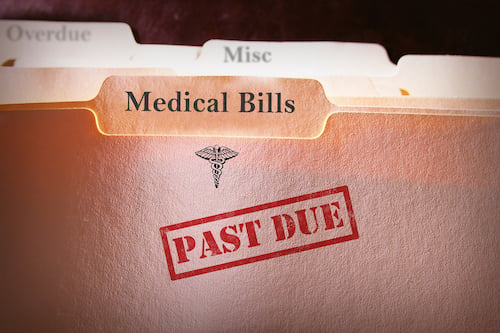- Law Practice Areas
- Resources For You
- Child Support Calculator
- Take Our Divorce Quiz
- Protect Your Assets and Net Worth During Divorce
- Blog
- Family Law Videos
- Your Guide to California Divorce
- Your Guide to Child Custody & Support
- Everything You Need to Know About Getting a Prenup
- An In-Depth Look at Divorce Mediation
- Top Considerations for High Asset Divorce
- Our Legal Team
- Locations
- Reviews
- Contact

Medical bills can be financially devastating. An unexpected accident or illness can leave you with thousands of dollars in medical bills. This can be overwhelming and put you and your family in a precarious financial situation. This is especially challenging if you are also dealing with injuries or a disability that inhibits your ability to work and earn money. Many people struggle to deal with large medical bills.
If this sounds like your situation, you are not alone. While it can feel like all hope is lost and you have no options, this is not the case. In some situations, it may be appropriate for you to file for bankruptcy as a means to deal with your medical bills.
Types of Bankruptcy
There are two primary types of bankruptcy an individual can petition for: Chapter 7 and Chapter 13. Chapter 11 bankruptcy is another option, but this is very rarely used by individuals and is typically more appropriate for businesses. Bankruptcy cases are handled at the federal level by the United States Bankruptcy Court. If you live in the San Diego area, your case will be handled in the Southern District of California.
In Southern California alone, over 5,500 bankruptcy cases have been filed with the court in 2020.
Chapter 7
Chapter 7 bankruptcy is the most common. Typically, this process involves liquidating an individual's assets to pay their creditors. Chapter 7 also discharges many of your debts, including medical bills. Chapter 7 aims to help someone out from under crushing debt and give them a fresh start. However, not everyone qualifies for this type of bankruptcy filing. An attorney can help you determine if you are eligible for a Chapter 7 bankruptcy filing.
Debts that typically cannot be discharged through Chapter 7 bankruptcy include:
- Child support
- Spousal support
- Student loans
- Tax debts
- DUI personal injury damages
- Wages owed to employees
Chapter 13
Chapter 13 bankruptcy offers individuals the opportunity to reorganize and repay their debt. Typically, a repayment plan for the next three to five years is established. Unlike Chapter 7, your assets are not liquidated during Chapter 13 proceedings. Some amount of your unsecured debt, such as medical and credit card debt, will be discharged at the end of the repayment period. The courts will determine what percentage of your unsecured debts you must pay, and you will make monthly payments for the duration of your repayment plan period.
If you have unpaid medical bills or credit card debt due to your medical bills, Chapter 13 may be a viable option for you.
Do I Need a Lawyer to File for Bankruptcy?
It is important that before filing for bankruptcy, you seek counsel from an experienced attorney, like ours at Cage & Miles. Bankruptcy law can be very complicated, and mistakes can result in an unsuccessful outcome. Additionally, there may be better alternatives to filing for bankruptcy that you are unaware of. A skilled lawyer can help you determine if and what type of bankruptcy filing is right for your situation and help you prepare for court. This process can be very stressful, but having an attorney by your side can bring you peace of mind.
Contact us online to discuss your case with an experienced lawyer.
What About COVID-19 Medical Bills?
If you or a loved one has been diagnosed with COVID-19, you may be worried about how you will pay for your medical treatment. This is especially concerning to those who are uninsured. If you are a California resident who needs testing or treatment for COVID-19, you do not need to worry about the cost.
Before paying medical bills for COVID-19 treatment, check with your insurance provider regarding your coverage. Typically, your treatment will be covered under your insurance policy. If you are uninsured, the government has a program to make sure that all necessary COVID-19 testing and care are paid for. This is done through a claims reimbursement to health care providers and facilities.
You may also enroll in California's COVID-19 Uninsured Group Program through Medi-Cal. This program has no income, resource, immigration, or other qualification requirements. To learn more about resources available to you for COVID-19 testing or treatment, view the Health Consumer Alliance FAQ page here.



